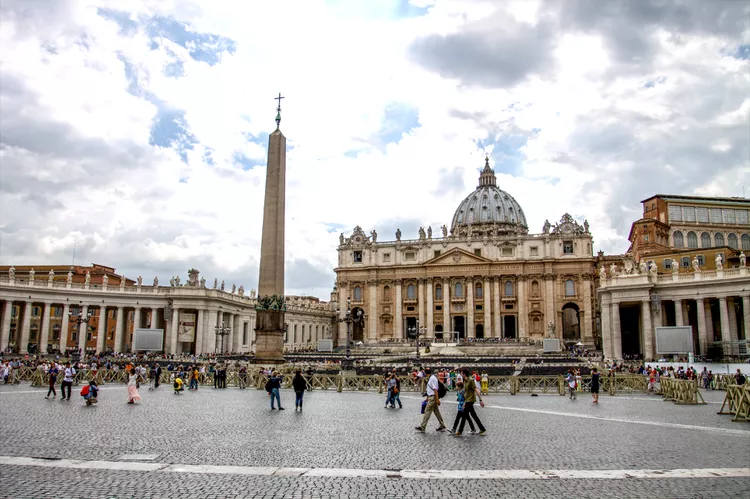Summary
Located in front of St. Peter’s Basilica, Saint Peter’s Square or Piazza San Pietro is one of the most iconic squares in Italy, functioning as a significant gathering place for tourists visiting the sights of Vatican City. Named after Saint Peter, an apostle of Jesus who is revered by many Catholics as the first Pope, this square is seen as an integral part of Rome. From St. Peter’s Square, visitors can view the Papal Apartments, which consist of the Pope’s living quarters and the area where he often addresses large crowds of pilgrims.
Visiting St. Peter’s Square is free at any time, 24 hours a day, except when closed for specific ceremonies.
History of Saint Peter’s Square
In 1656, Pope Alexander VII commissioned renowned sculptor and architect Gian Lorenzo Bernini to design a square that reflected the magnificence of St. Peter’s Basilica. Bernini created an elliptical piazza, flanked on two sides by rows of grand Doric columns arranged in a stunning colonnade. This double colonnade symbolizes the embracing arms of St. Peter’s Basilica, recognized as Christianity’s Mother Church. On top of the colonnades, there are 140 statues of saints, martyrs, popes, and founders of various religious orders in the Catholic Church.
The key aspect of Bernini’s design focuses on symmetry. He built the square around a 385-ton Egyptian obelisk that was originally brought to Rome by Caligula in 37 BC, firmly positioned in its location in 1586. Moreover, Bernini arranged his piazza around the obelisk’s central axis. The piazza features two small fountains, each positioned equidistant from the obelisk and surrounding colonnades. One fountain was crafted by Carlo Maderno, who renovated the façade of St. Peter’s Basilica in the early 17th century, while Bernini constructed a matching fountain on the north side of the obelisk, achieving a balanced design for the piazza. The combination of cobblestones and travertine blocks, arranged to radiate from the obelisk’s central hub, also enhances the symmetry of the layout.
Best Viewpoints
To appreciate the symmetry of this architectural marvel, standing on the roundel foci pavements near the piazza’s fountains is highly recommended. From these points, the four rows of the colonnades align beautifully behind each other, offering an impressive visual experience.
How to Get There
Vatican City is situated on the west side of the River Tiber, while Rome’s main attractions—including the Trevi Fountain, the Pantheon, and the Spanish Steps—are located on the east side. The most convenient way to reach Saint Peter’s Square is by taking Metro Line A to the Ottaviano “San Pietro” stop. Alternatively, visitors may opt to take a taxi, simply informing the driver to head to Piazza San Pietro. If you choose to use a taxi, be sure to ascertain the fare beforehand to avoid any unexpected charges.




